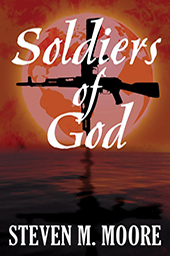There’s zing in -ing…
I get tired of the writing advice “Show, don’t tell.” After all, what I do is storytelling, not story-showing. Writing classes and guides wind newbie writers around the axle with this advice; older writers too. Authors get so wound up that they write some awful prose as they try to “follow the rules.”
An application of this rule (or, just a dictum people who can’t write blather about) is something like a corollary: Avoid –ing words. Sorry, there can be a lot of zing in –ing: In action scenes, for example. Gerunds have all sorts of uses, of course, and they allow a writer to create compact prose that flows rather than stagnates.
Some MFA profs with nothing better to do will tell their students never to use something like “He was pounding a stake into the ground,” saying that “pounding” is an –ing word. What they probably mean (I’m trying to make them sound less stupid—after all, they’re usually academics) is that “was” isn’t a strong verb, but that’s patently wrong too. The writer of that phrase is only emphasizing that the action was continuous. “He pounded…” means the pounding was only done a few times and then it’s all over with. (At least that’s my take.)
This point is clearer to many speakers of some foreign languages. “Pegó la estaca…” isn’t equivalent to “Pegaba la estaca….” in Spanish. Russian resolves the same problem by using two or more different verbs (action verbs sometimes come in triplets). And so on…. (Both Spanish and Russian often eliminate pronouns too when they’re obvious. English also probably should, and does so in hard-boiled or minimalist writing. Tricky! In any case, Russian, Spanish, and other foreign language speakers are more aware of the difference between limited action and continuous action. In the English phrase, that “was” with the gerund “pounding” indicates continuous action. There’s no other way to write it if the author wants to emphasize the continuity of the action.
Loose gerunds are a bit trickier. They have to be attached in some logical way. “Harry spotted the beach chair walking to the store…” still emphasizes the action, but the chair doesn’t do the walking! A correct usage would be “Walking to the store, Harry spotted…,” a bit clumsy but grammatically correct (unless the character is a young magician named Harry who made the chair walk!). The author could also use “As he was walking to the store, Harry spotted…” or “As he walked to the store, Harry spotted…” (the latter is okay because presumably Harry only came upon the chair once, not many times).
And, to end on a more conciliatory note offered to all those writing gurus out there, let’s consider this ribald church bulletin notice full of some different zing and misuse of –ing words: “This evening at 7 pm there will be a hymn singing in the park across from the church. Bring a blanket and come prepared to sin.” (Apparently church bulletins have no good editors.)
Be smart…and stay safe.
***

Comments are always welcome.
Soldiers of God. This is a bridge novel between the “Clones and Mutants Trilogy” and the “Chaos Chronicles Trilogy.” An FBI agent and a priest are out to stop a fanatical religious group’s terrorist attack plans. In the background, a maniacal industrialist is pulling the strings, using religion to further his agenda. Will they succeed? This is one of my evergreen books, and it’s available wherever quality ebooks are sold.
Around the world and to the stars! In libris libertas.
